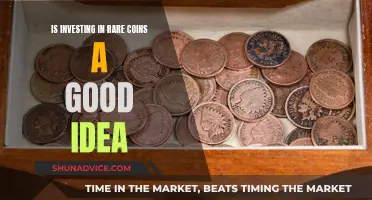
Bitcoin is a cryptocurrency that was created in 2009 by Satoshi Nakamoto and was designed to be a digital currency free from the reach of governments and central banks. It is a decentralised currency, with transactions all over the world recorded and stored on a public ledger known as the blockchain.
Canada has embraced Bitcoin, with many exchanges, brokers, and even ATMs offering Bitcoin for sale. The first step to buying Bitcoin is to sign up for an exchange and create an account. You will need to verify your identity and set up and fund your account. You can then decide where to store your Bitcoin, either on the exchange itself or in a digital wallet. Finally, you can purchase your Bitcoin, choosing how much you want to buy and selecting your payment method.
| Characteristics | Values |
|---|---|
| How to buy Bitcoin in Canada | Sign up and get KYC (Know-Your-Customer) verified on a Canadian crypto exchange like Bitbuy |
| Deposit CAD to the exchange directly from your bank account | |
| Store Bitcoin on your exchange account or transfer it to a wallet | |
| Make a Bitcoin Buying Strategy | |
| Decide Where to Buy Bitcoin | |
| Sign up & Get Verified to Buy Bitcoin | |
| Fund Your Canadian Crypto Exchange Account | |
| Sending Bitcoin Off a Canadian Cryptocurrency Exchange |
What You'll Learn

Bitcoin ATMs in Canada
Bitcoin ATMs are not to be confused with traditional bank ATMs. They are linked to the internet and have no connection to bank networks. Their purpose is to provide a platform for the buying and selling of Bitcoin. There are two main types of Bitcoin ATMs: basic ones that only allow users to purchase Bitcoins, and more complex ones that enable users to buy and sell the cryptocurrency.
The world's first Bitcoin ATM was opened in a coffee shop in Vancouver back in 2013. Since then, the number of Bitcoin ATMs in Canada has grown significantly, with approximately 2528 machines across the country as of 2024. The largest concentration of these ATMs can be found in Calgary, Montreal, Toronto, and Vancouver.
Using a Bitcoin ATM comes with certain advantages and disadvantages. On the one hand, they provide users with a high degree of anonymity, which is a desired characteristic of Bitcoin. On the other hand, transaction fees tend to be high, and there are limits on the size of transactions. Additionally, the distances to the nearest Bitcoin ATM may be too great for some users, making it more convenient to buy and sell Bitcoin via an exchange or online platform.
When using a Bitcoin ATM, it is important to consider the fees and transaction limits. It is also essential to have a digital wallet to store your Bitcoins, as this gives you complete control over your digital assets.
Get Free Bitcoins: Easy Ways to Earn Without Investment
You may want to see also

Bitcoin as an investment or digital asset
Bitcoin is a cryptocurrency, a digital currency with no physical version, that was created by Satoshi Nakamoto and released in 2009. It is a decentralised digital currency, meaning it falls outside the reach of governments and central banks. Bitcoin transactions are recorded and stored on the blockchain, a public ledger that is found on all of the computers within the Bitcoin network.
Bitcoin can be bought and sold using a crypto trading platform or online exchange. Transactions are highly secure and can’t be easily shut down by governments. They are also public, but the identities of the sender and recipient remain anonymous.
Bitcoin can be purchased in Canada in several ways: via Bitcoin exchanges, through CFD brokers, or through ATM’s.
Buying Bitcoin as an investment
If you are buying Bitcoin as an investment, it is important to be aware of the risks. Bitcoin is notoriously volatile, and there is no telling if or when the bubble will burst. Bitcoin investing also comes with fewer protections than other types of investments and is not insured by the government. There are also security risks, and hackers will be looking for ways to access your accounts.
If you are buying Bitcoin for the first time, it is recommended that you stick with well-known exchanges such as Coinbase, Kraken and Gemini. You will need to set up and fund your account, and decide where to store your Bitcoin – either on the exchange itself, or in a digital wallet.
Bitcoin as a digital asset
Bitcoin can also be used as a digital asset or currency to buy and sell goods and services. More and more retailers are accepting Bitcoin for purchases, and it can be used to transfer value to friends and family, and move money internationally.
Tax implications
In Canada, cryptocurrencies such as Bitcoin are treated as commodities by the Canada Revenue Agency (CRA) and are subject to specific tax regulations. While there are no immediate tax implications when you buy and hold cryptocurrencies, you must consider the tax implications when you decide to sell or use them to purchase goods or services. Any capital gains or losses resulting from the sale or other dispositions of cryptocurrencies must be reported on your income tax return.
Strategic Bitcoin Investments: Making Profits with Crypto
You may want to see also

Bitcoin wallets
Hot wallets are on devices that are connected to the internet. They are often free to use and offer add-on services such as trading or staking in exchange for fees. However, they may be more vulnerable to hackers. Examples of hot wallets include the Crypto.com Defi Wallet, Zengo Wallet, and Coinbase Wallet.
Cold wallets are on devices that are disconnected from the internet. They tend to cost money as you have to buy a piece of hardware. They may be harder for other users to reach but losing the device could make recovery difficult. Examples of cold wallets include Ledger and Trezor.
When choosing a Bitcoin wallet, it is important to consider the number of digital assets supported, the ease of moving crypto offline, and the availability of resources for in-app staking or rewards programs. It is also crucial to back up and secure your wallet to prevent loss of funds.
Strategic Investment: Allocating Funds to Dogecoin
You may want to see also

How to buy Bitcoin safely
Step 1: Decide where to buy Bitcoin
You have several options for where to buy Bitcoin:
- Cryptocurrency exchanges
- Traditional brokers
- Bitcoin ATMs
- Peer-to-peer exchanges
As a beginner, it is recommended to stick with well-known cryptocurrency exchanges such as Coinbase, Kraken, and Gemini.
Step 2: Set up and fund your account
Set up an account on your chosen exchange, verify your identity, and connect your payment method. You can typically use ACH bank transfers, debit cards, credit cards, wire transfers, or even PayPal to fund your account. Different exchanges charge varying fees based on the payment method, so be sure to do your research.
Step 3: Decide where to store your Bitcoin
While you can store your Bitcoins on the exchange itself, this is not recommended as your money could be lost if the exchange is hacked. For better security, you can use a digital wallet. There are two types of wallets:
- Hot wallet: Runs directly on your smartphone, tablet, or computer, meaning your private keys are generated on an internet-connected device. This option is more convenient for active trading but is also more vulnerable to hackers.
- Cold wallet: A physical device, such as a USB drive, that stores your private keys offline. This option provides better security but is less convenient for regular trading.
Step 4: Buy your Bitcoins
The specific purchase process will vary depending on the exchange, but typically involves choosing the type of cryptocurrency and amount you want to buy, selecting your payment method, and confirming your order.
Safety Tips:
- Don't invest money you can't afford to lose.
- Understand the process: Do your own research and don't invest in anything you don't understand.
- Keep everything secure: Use a strong password, two-factor authentication, and a hard wallet to protect your funds.
- Track everything: Just like with traditional investments, you must pay taxes on cryptocurrency-related income, so be sure to keep detailed records of all transactions.
Investing in Bitcoin: How Much Money Do You Need?
You may want to see also

How to avoid Bitcoin nightmares
Investing in Bitcoin can be a thrilling prospect, but it's important to be aware of potential pitfalls that could turn your investment dreams into a nightmare. Here are some tips to help you navigate the world of Bitcoin in Canada while minimising risks:
- Choose a Reputable Platform: Opt for well-known crypto trading platforms or exchanges that have been in the business for a while, such as Coinbase, Kraken, or CEX.IO. These platforms typically offer higher levels of security and have established procedures in place to protect your investment.
- Diversify Your Portfolio: Avoid putting all your eggs in one basket. Diversify your investments across different cryptocurrencies and investment vehicles to reduce the impact of any single loss. This strategy can provide a safety net in the volatile crypto market.
- Secure Your Wallet: Always use a secure digital wallet to store your Bitcoin. Research the various types of wallets available, such as hot wallets (online) and cold wallets (offline). Cold wallets, such as hardware wallets or paper wallets, are generally considered more secure as they are less susceptible to hacking attempts.
- Enable Two-Factor Authentication (2FA): Adding an extra layer of security to your accounts is always a good idea. Enable 2FA wherever possible to protect your personal information and assets. This typically involves providing something you know (a password) and something you have (a code generated by an app or sent via SMS).
- Be Wary of Scams: The world of cryptocurrency is rife with scams and fraudulent schemes. Be cautious when approached with "too good to be true" investment opportunities. Always research the sender and verify the legitimacy of any platform or individual before sending funds or sharing sensitive information.
- Keep Yourself Informed: Stay up to date with the latest news and developments in the crypto space. Follow reputable sources and subscribe to industry publications to avoid missing critical updates that may impact your investment decisions and portfolio health.
- Don't Invest More Than You Can Afford to Lose: Bitcoin and other cryptocurrencies are highly volatile and unpredictable. Only invest an amount that you are comfortable losing. This advice may seem conservative, but it can save you from financial ruin if the market takes an unexpected turn.
- Beware of High Fees: Be mindful of the fees associated with buying, selling, and transferring Bitcoin. Some platforms and ATMs charge exorbitant fees that can quickly eat into your profits. Compare fees across different service providers to find the most cost-effective option for your needs.
- Don't Store Bitcoin on Exchanges: While exchanges are convenient for trading, they are not the safest place to store your Bitcoin for the long term. It's best to transfer your Bitcoin to a personal wallet that gives you full control over your private keys. This way, you reduce the risk of losing your funds if the exchange is hacked or goes out of business.
- Backup Your Recovery Seed: If you use a hardware wallet, ensure you back up your recovery seed phrase securely. This backup will allow you to restore access to your wallet and funds if your device is lost, stolen, or damaged. Store your seed phrase in multiple secure locations to avoid permanent loss.
Best Long-Term Crypto Investments: Picking the Winners
You may want to see also
Frequently asked questions
You can buy Bitcoin in Canada through a crypto trading platform, a cryptocurrency exchange, a traditional broker, a Bitcoin ATM, or a peer-to-peer exchange.
All investments carry an element of risk, but there are some unique risks associated with Bitcoin. The cryptocurrency is extremely volatile, and there is no telling if or when the bubble will burst. Bitcoin is also less regulated than other types of investments and is not insured by the government. There are also security risks, and Bitcoin-related fraud is on the rise.
Only invest money you can afford to lose, do your research, and keep your Bitcoin secure with a complicated password, two-factor authentication, and a hard wallet.
In Canada, cryptocurrencies are treated as commodities for tax purposes. There are no immediate tax implications when you buy and hold cryptocurrencies, but you must report any capital gains or losses resulting from the sale or other dispositions of cryptocurrencies on your income tax return.







